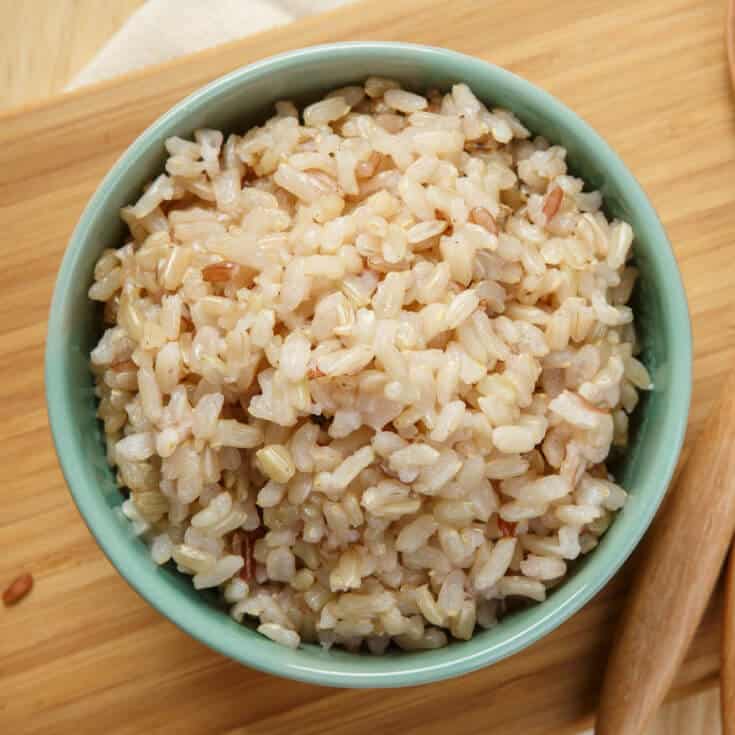This Dr. Axe content is medically reviewed or fact checked to ensure factually accurate information.
With strict editorial sourcing guidelines, we only link to academic research institutions, reputable media sites and, when research is available, medically peer-reviewed studies. Note that the numbers in parentheses (1, 2, etc.) are clickable links to these studies.
The information in our articles is NOT intended to replace a one-on-one relationship with a qualified health care professional and is not intended as medical advice.
This article is based on scientific evidence, written by experts and fact checked by our trained editorial staff. Note that the numbers in parentheses (1, 2, etc.) are clickable links to medically peer-reviewed studies.
Our team includes licensed nutritionists and dietitians, certified health education specialists, as well as certified strength and conditioning specialists, personal trainers and corrective exercise specialists. Our team aims to be not only thorough with its research, but also objective and unbiased.
The information in our articles is NOT intended to replace a one-on-one relationship with a qualified health care professional and is not intended as medical advice.
Is Toxic Poop a Myth or Reality?
October 8, 2021

“Toxic poop” is a term used to describe guck and impacted fetal matter that has built up in someone’s colon over the course of months or even years.
We hear about the potentially dangerous effects of toxic poop most often from people who promote colon cleanses in order to rid the body of lingering waste. In fact, the man who came up with term toxic poop, a naturopath named Richard Anderson, was the creator of a popular colon cleanser.
So is it a real thing? Let’s find out below, along with tips for keeping your digestive system healthy so toxicity is less of a concern.
Is Toxic Poop a Myth?
Is poop really toxic? Not exactly; at least not in the vast majority of cases.
While it’s possible for some people to have dysfunctional gastrointestinal tracts that are associated with toxicity, this is rare and not a problem amongst many adults.
The concept of toxic poop has been thrown around the natural health space in recent years in a way that’s misleading and confusing. Companies who promote and sell colon cleanses claim that adults can have anywhere from 5 to 20+ pounds of residual poop hiding within their guts, supposedly contributing to issues like weight gain, fatigue, brain fog and more.
But toxic poop has never been proven to be real, and in fact, the available evidence suggests it’s simply a myth.
One of the biggest arguments against the existence of toxic poop is the fact that medical professionals who have performed surgeries, treatments and autopsies on thousands of people’s colons — including radiologists and gastroenterologists— have not found fecal matter encrusted in anyone’s colons or intestines.
As one gastroenterologist told The Wall Street Journal, “I’ve seen a lot of colons and the notion that people have pounds of feces and evil toxins built up in there is pure fantasy… Claims for colonics and other forms of cleansing just play to people’s fears and desire to lose weight.”
So while constipation, and sometimes GI infections, are a real concern for some people, but pounds of hidden toxic poop? Not so much.
The Toxic Megacolon
Even though the idea of toxic poop may seem a little outrageous, many medical experts agree that it’s still possible for people’s colons to become somewhat “toxic”environments — in other words, unhealthy — due to habits like eating a poor-quality diet and ingesting certain drugs and chemicals.
However, this doesn’t mean that people are walking around carrying pounds of impacted poop in their bodies.
One rare condition that can lead to a very unhealthy colon is called “toxic megacolon,” which is a complication of severe colon disease or infection. According to Johns Hopkin’s Medicine, “toxic megacolon can be deadly because it puts you at risk for infection throughout the body, shock, and dehydration.” This condition is not very common at all, but when it does occur, it’s life-threatening and must be treated right away.
How do you know if you have toxic megacolon? Signs and symptoms caused by toxic megacolon include:
- Swelling of the belly
- Stomach pain
- Fever
- Rapid heart rate
- Shock
- Diarrhea and sometimes changes in stool color
- Severe inflammation of the colon
Toxic megacolon is usually triggered by other gastrointestinal diseases, including ulcerative colitis (a type of inflammatory bowel disease), Crohn’s disease, or infections in the colon caused by the germ called C difficile.
Sometimes poor circulation to the colon, colon cancer , diabetes, kidney failure, COPD or poor immune function might also play a role in its development.
How to Get Rid of Toxic Poop
So how do you get rid of toxic poop? What you’re really trying to do is keep your colon and intestines in good shape, thereby reducing constipation, bloating and other GI issues.
By eating a healthy diet, exercising, managing stress, and generally taking care of your digestive and immune systems, you should stay “regular” in terms of elimination and detoxification, and therefore you don’t need to rely on colon cleanses.
1. Consume Plenty of Fiber
A high-fiber diet is often the number one recommendation for promoting regular bowel movements and keeping the colon healthy. High-fiber foods include vegetables, fruits, beans/legumes, nuts, seeds and 100% whole grains. Here are some of the best sources of fiber to focus on:
- All beans, pulses or legumes like peas, chickpeas, black beans, etc.
- Avocado
- Sweet potatoes and winter squash
- Apples and pears
- Berries
- Figs and prunes
- Chia and flax seeds
- 100 percent unprocessed grains like oats, bran and quinoa
- Veggies like leafy greens, broccoli, artichoke, peppers, mushrooms, etc.
2. Drinks Lots of Water
Water is absorbed by fiber in your GI tract and helps to keep your body hydrated, which assists in elimination. The best way to stay hydrated is to drink enough water throughout the day, but other low-sugar/no-sugar fluids can also help, such as coconut water, 100 percent fresh juice, herbal teas, bone broth and seltzer.
Warm or room temperature liquids (as opposed to very cold drinks), especially when consumed first thing in the morning, tend to stimulate digestion. When you need a simple home remedy for constipation, try some warm water infused with lemon, sea salt and a bit of raw honey, or warm coffee in moderation or bone broth.
3. Tackle Constipation Holistically (Exercise, Manage Stress, Limit Inflammatory Foods)
Constipation can be caused or worsened by things other than your diet, such as high stress levels, being sedentary or taking certain medications.
Physical activity increases muscle activity in your intestines, so try to fit in more movement and formal exercise most days of the week, especially in the morning if this is when you usually go to the bathroom.
Stress can also interfere with gastrointestinal health by increasing muscle tension, increasing levels of “stress hormones” like cortisol, causing blood sugar levels to rise, altering your appetite, and even changing your gut microbiome. Some ways to relieve stress include: breathing exercises, yoga (try these yoga tips for constipation), meditation, prayer, spending time outdoors, reading and writing a journal.
Your digestion and colon health can also suffer if your diet includes lots of processed foods that offer little fiber or nutrients. These include foods that are common in the “Standard American Diet” such as: processed meats (like cold cuts or hot dogs), cheeses, sweetened cereal, breads, pasta, chips, fast food, ice cream, fried foods made with trans-fats, and too much alcohol.
4. Consider Fiber Supplements/Natural Laxatives If Needed
If the steps above don’t do enough to keep your digestion on track, you may benefit from certain fiber blends or supplements that promote bowel movements. These “natural laxatives” work in ways such as adding bulk to stools and stimulating intestinal contractions.
Classic fibers include psyllium husk, flax seed, fennel seed, slippery elm bark and apple pectin. It’s important to drink plenty of water when adding these to your routine. Here’s a bit about the benefits of these supplements:
- Sprouted chia seeds and flaxseeds: high in fiber and healthy fats, plus they help to absorb water. Try to consume about 2–3 tablespoons of seeds (soaked ideally to help release nutrients) daily with water or liquid, and consider taking 1 tablespoon daily of flaxseed oil.
- Psyllium husk: a natural constipation treatment because it’s high in fiber and helpful for forming stool. When combined with water or another liquid, psyllium husk swells and produces more bulk.
- Cod liver oil: a traditional remedy used upon waking is taking 1 tablespoon of cod liver oil or flaxseed oil mixed with 8 ounces of fresh pressed carrot juice to stimulate bowel movements.
- Aloe vera juice: helps to reduce inflammation and improve the frequency of bowel movements. Take 1/4 cup twice daily while adjusting the amount based on symptoms.
Don’t be surprised if you experience changes in stool consistency and color once you start making improvements to your diet and lifestyle.
What color is detox poop? Poop may become green or different shades of tan and brown if you’re experiencing diarrhea. Some people may also pass black stools if they are using colon cleansing products due to mucilaginous fiber in the products themselves combined with black bile from the liver.
This should clear up with a week or so, but if it doesn’t and you notice other symptoms, cut back on these supplements and see if things improve.
Risks
Be cautious about using any colon cleansing products or treatments, including colonics, that can often have side effects. For example, some that contain laxatives or ingredients such as guar gum (which are also promoted as being capable of curbing your appetite) that can cause side effects like esophageal and intestinal blockages, as well as diarrhea and dehydration.
Be sure to add fiber to your slowly while drinking lots of water in order to help your body adjust. Consuming lots of fiber without drinking enough fluids may actually digestive issues worse, so drink up!
Final Thoughts
- Most health professionals don’t believe that toxic poop is a real thing, however people can still have other colon and intestinal problems due to eating a poor diet, stress, low immune function, infections and other factors.
- How do you know if you have a dysfunctional colon (also called a “toxic megacolon”)? Toxic megacolon is due to complications of severe colon disease or infection which can cause swelling, pain, diarrhea, fever and other symptoms; it’s rare but life-threatening.
- To keep your GI tract healthy: eat lots of fiber, drink plenty of water, avoid processed foods, manage stress, exercise, and try fiber supplements or natural laxatives if necessary.












